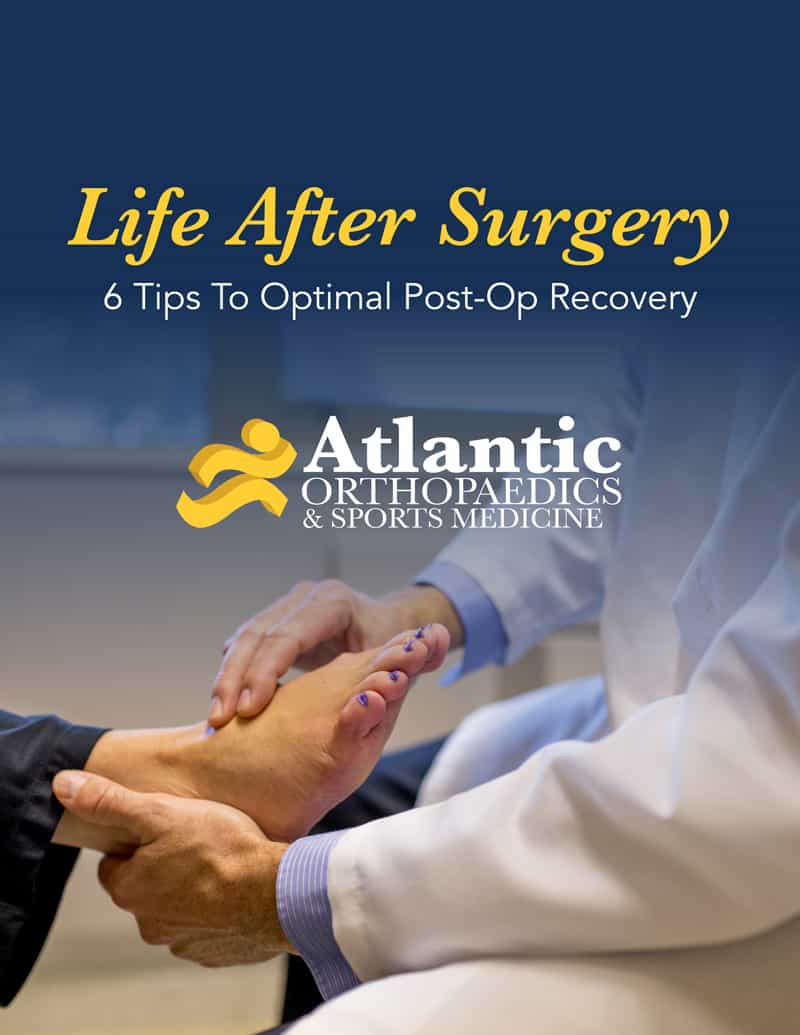Cartilage Restorations and Transplants

What Is Cartilage Restoration?
The knee is home to two types of cartilage: meniscus and articular. Together, they work to protect the knee by providing joint lubrication and shock absorption. But repetitive motion activities like running, trauma caused by accidents or sports, or persistent re-injury can all contribute to cartilage damage and deterioration over time. As a result, many people with cartilage loss will notice their knee click, lock, or swell due to a lack of padding around the bone. Cartilage restoration and transplant can be an effective treatment to resurface the knee, preventing the need for more invasive surgery down the road. This procedure is best suited for active, young adults with damaged cartilage in the knee. Reach out to our providers today to see if this treatment might be right for you.
Cartilage Care at Atlantic Orthopaedics
If you are experiencing knee pain, you are not alone. Atlantic Orthopaedics offers cutting-edge treatments to resolve knee and other joint pain, including cartilage damage caused by acute sports-related injuries or repetitive motion trauma, as well as early symptoms of arthritis.
Dr. Tyler Welch and his team utilize the latest arthroscopic cartilage restoration techniques to serve patients throughout the Seacoast of NH, southern ME, and northern MA. With minimally invasive arthroscopic knee surgery for cartilage damage, the surgeon makes a small incision around the knee joint to repair torn tissues, stimulate the bone marrow to produce new cartilage, or replace damaged cartilage with a graft. This approach may help preserve the knee and prevent knee replacement surgery.
Cartilage Restoration and Transplant Evaluation
Make an appointment with Dr. Welch today to see if cartilage restoration is right for you. Call our offices at 603-431-1121 (Portsmouth, NH) or 207-363-3490 (York, ME) or request a consultation through our Online Scheduling Form.
More Info | Cartilage Restoration
While there are many conditions that could contribute to knee pain, the two most common risk factors of cartilage damage include progressive degeneration (overuse, re-injury, or daily wear and tear) and joint trauma. In the case of progressive degeneration, cartilage fragments are lost or worn down over time and can be a leading risk factor in knee osteoarthritis. Meniscus or ligament tears may also be a good indication that cartilage damage is present.
Pain in the knee that may be caused by pervasive cartilage damage could include:
Symptoms
Pain when bending the knee
Stiffness
Swelling
Locking or clicking of the knee
Decreased range of motion
Tenderness
Conditions
Runners’ Knee (Patellofemoral Syndrome)
Osteoarthritis
Injuries
Detached Cartilage of Bone in the Knee Joint
Sports Injuries
Joint Dislocation
A fall or blow of the knee joint
Contact us if you’re experiencing pain in your knee or did not see your symptoms, condition, or injury listed. We can help.
While injury or trauma to the joints can happen unexpectedly, there are preventative measures you can take to reduce the risk of cartilage loss:
- Exercising regularly
- Adequate rest for overused joints
- Avoiding high-risk activities
The treatment for damaged cartilage can vary significantly depending on the severity and nature of the injury. Because articular cartilage does not have access to its own blood supply, it is unlikely that it will heal on its own, however, in some instances, lifestyle modification is an appropriate route to healing. This may include reducing activity levels, going to physical therapy, taking medication, or using bracing as a few examples. In more severe cases, a cartilage replacement or transplantation may be necessary. Surgical candidates for a cartilage restoration procedure are typically younger adults with a limited history of joint injury, whereas older patients may benefit more from lifestyle adjustments.
It is important to address cartilage damage early in order to prevent progressive degeneration or osteoarthritis.
Surgical Treatments
- Knee Arthroscopy
- Cartilage Transplants
- Cartilage Grafting
- Nonofracture with Biologic Supplementation
- Meniscal Transplantation
Call our offices today to see what treatment might be right for you. 603-431-1121 (Portsmouth, NH) or 207-363-3490 (York, ME)
Evaluate or Treat Your Cartilage Damage
Treating Providers | Cartilage Restoration
Our Cartilage Restoration and Transplant Surgeons are leaders in diagnosing and treating competitive athletes and individuals of all ages and activity levels throughout Maine, New Hampshire, and Massachusetts. We are dedicated to relieving your knee pain so you can get back on the field or back to life.

